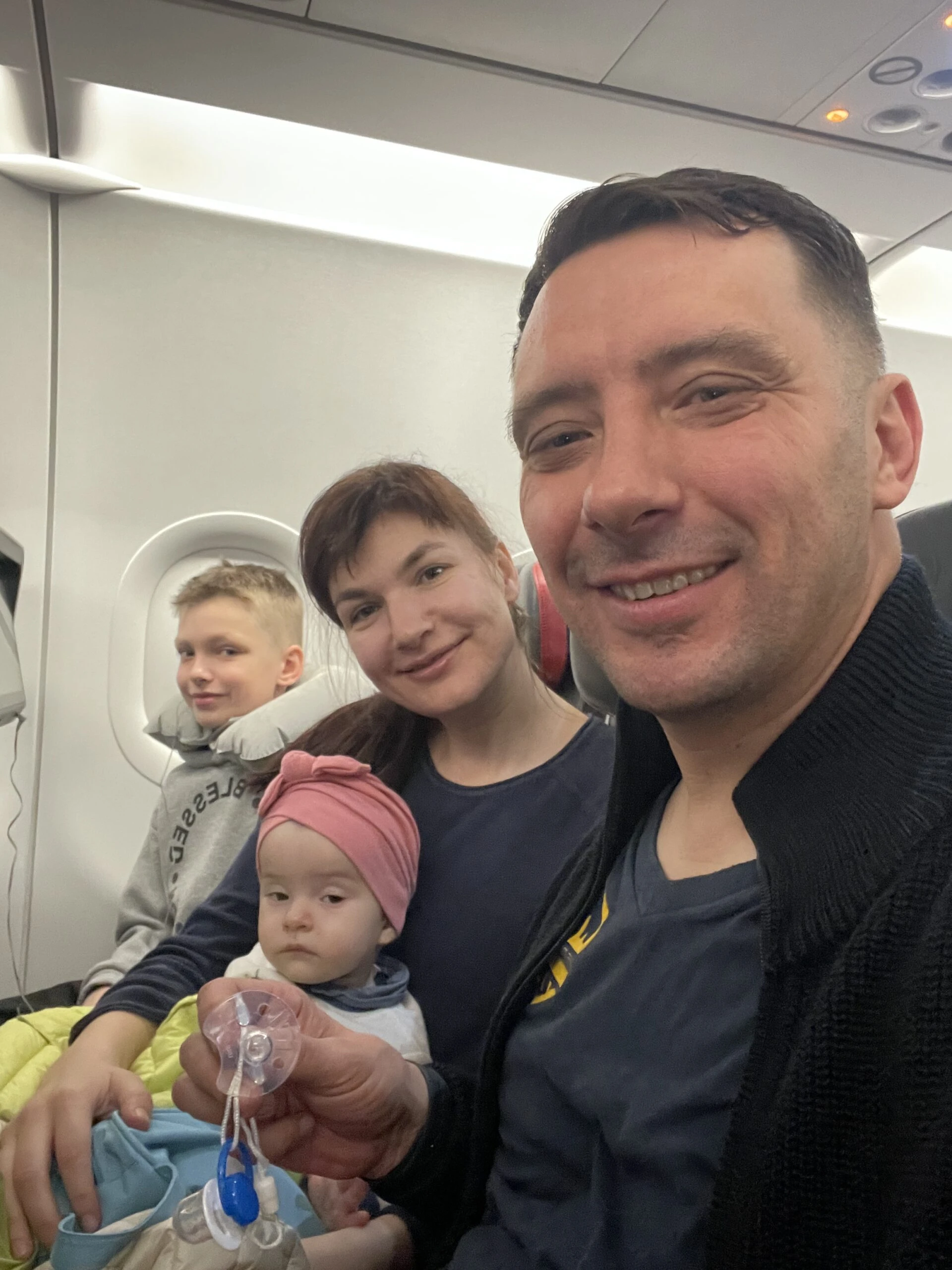Intercultural Marriage: A Ukrainian and a Gagauzian in Kyrgyzstan
26 April 2024
“You have to learn to live in a new culture with that culture in mind, not bringing traditions and rules, but the essence of Christ himself” – a missionary family in Kyrgyzstan.
Andriy and Katia are a couple who started a family at the intersection of three cultures. He is Ukrainian and she is Gagauzian, and they live and serve together in Kyrgyzstan, where they arrived a week after their wedding 12 years ago.
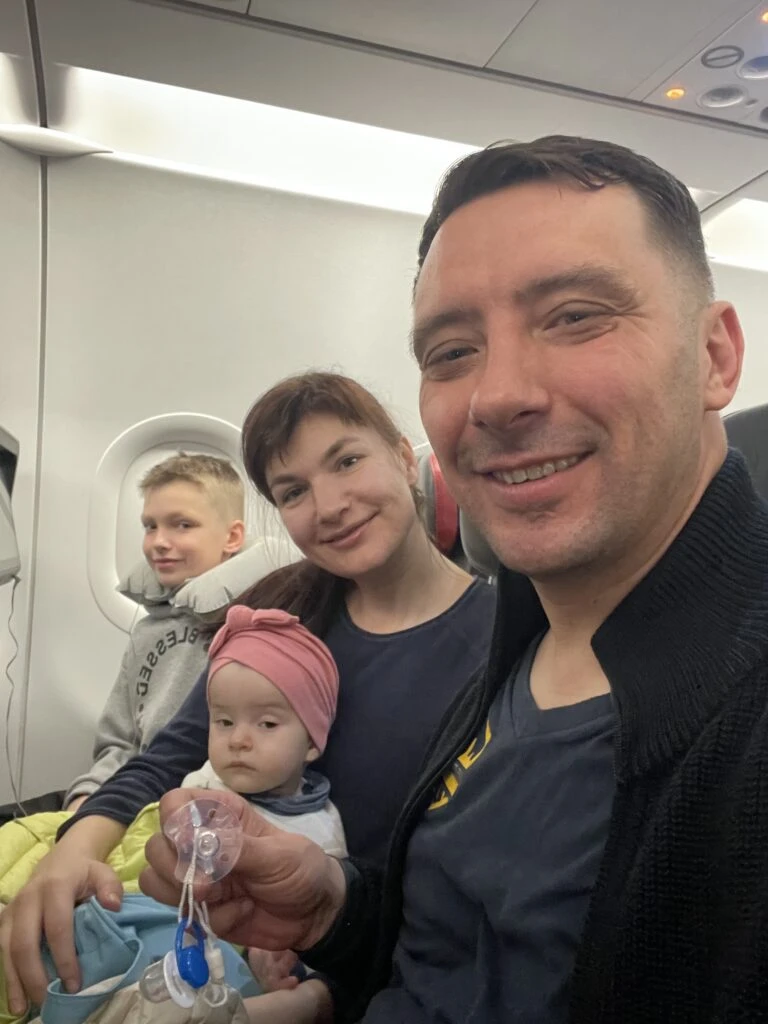
Today they are officially citizens of Kyrgyzstan. In 2019, they opened and now lead a church devoting much of their time to ministering to children, teens, and young adults.
How did the online dating method work, and why didn’t Katia go to Africa as a missionary? What kind of partner was Andriy looking for, and what influenced his choice? How do intercultural relationships affect character and ministry, and how do you work together when both husband and wife are leaders? Also, what kind of food is eaten in Kyrgyzstan and what old traditions are still alive in this Asian country?
How did you meet and end up in Kyrgyzstan?
Andriy: I met Katia in the fall of 2011 on a dating site called “Invictory”.
Before I met Katia, I had a relationship in Ukraine, but it didn’t end well. I went to Kyrgyzstan on my own in 2009 after graduating from a missionary school in Donetsk.
I encountered a problem: the mentality in Kyrgyzstan is very different from the Slavic mentality. It was difficult to build relationships, even though I wasn’t really looking for them. It was hard for me to imagine myself with a girl from the local culture.
On the other hand, no one from Ukraine wanted to go to Kyrgyzstan, and I wanted to stay in the mission.
Someone on our mission team advised me to use the dating site Invictory.
At the time, I didn’t think this was the way to meet someone. But I signed up, talked to some sisters (here and further: sister/brother in Christ – ed.), and met some of them.
After a while, I realized that in order to start a family, I needed a more serious approach, and in order to find people with similar views, I specified all the criteria in my profile on the site.
And that’s when Katrusia wrote to me.
Did you specify “missionary work” there?
Andriy: Yes, “missionary work” and “work with children”.
Katia: Let me tell what you specified (both laugh).
I consciously came to God at the age of 21. I didn’t have the goal of getting married or dating right away. I wanted to learn more about Christianity, but I felt uncomfortable talking about this in church with people younger and more knowledgeable about God. I felt like I looked bad against their background.
So I registered on the Invictus website to communicate with Christians.
But I noticed that for some reason the sisters were not communicating, not responding to my messages. For a long time I was not on this site, and later I met a brother, we saw each other, but the relationship did not work out, and after that I did not want to meet anyone else.
I had a goal to go on a mission to Africa, for which I worked as a call center manager and raised money. At that time I was living in Chisinau, Moldova. I really wanted to be a missionary. I got a degree in economics to support myself financially. All I needed was the blessing of my parents.
One day I prayed about a relationship: “Lord, you know I don’t know how to choose. I grew up in a non-believing family, I just want You to give me one, just take them all away so that no one will offer me a date because I’m lost. And give me someone who will love You.”
I had a goal to go on a mission to Africa, for which I worked as a call center manager and raised money. At that time I was living in Chisinau, Moldova. I really wanted to be a missionary. I got a degree in economics to support myself financially. All I needed was the blessing of my parents.
One day I prayed about a relationship: “Lord, you know I don’t know how to choose. I grew up in a non-believing family, I just want You to give me one, just take them all away so that no one will offer me a date because I’m lost. And give me someone who will love You.”
At first I had high criteria, but I crossed them all out. The most important thing for me was that he should do good deeds with a pure heart, without guile. I forgot about this prayer and continued to prepare for my trip to Africa.
I was offered to look for a match in the “Africa” category on the same dating site, Invictory. Then I thought I should look for a brother in Christ, because if something happened to me in Africa, he would definitely protect me.
Andriy indicated that he lived in Zimbabwe and was raising three children. When I read that, I thought they were orphans. It was meant as a joke, but I took the bait.
Why did you make this joke?
Andriy: No, it wasn’t really a joke. In fact, I was raising three kids that my colleagues and I took from the streets.
Why did you choose Zimbabwe? I was from Ukraine, but I was living in Kyrgyzstan, so I thought: I’ll write “Ukraine” in the option, but I don’t live there! I could write “Kyrgyzstan” but I’m not from Kyrgyzstan. I thought: I’ll write Zimbabwe. Of course, I chose that name as a joke. I thought no one would believe that I live in Africa. But Katia did.
Katia, did you write him first?
Yes, I texted him: how are things in Africa, how are the children? But he didn’t tell me anything about Africa. He always tried to persuade me to communicate with him, like a sister with a brother. But I put up a barrier because I had a goal – Africa and no personal acquaintances.
Andriy: But she was smiling.
Katia: I smiled, actually. But all the time I was thinking, “How can a person who is on a mission not date anyone? I thought it was a trick.
We had been chatting for about a month when he asked me jokingly, “Do you want me to come to you?” And I jokingly replied: “Of course.”
After a while, he showed me the tickets to Moldova that he had bought to meet me. Then I asked my roommates to show me where Kyrgyzstan was on the map.
Andriy: It seemed to me that our relationship was developing.
Before that, I was dating a sister in Alma-Ata, but I realized that we didn’t have any common interests, and I didn’t want to communicate for nothing. I was looking for someone to build a relationship with.
I was impressed by the fact that Katrusia had already been on short missions, which was what I was looking for. It told me that she led an independent life, worked without the help of her parents, and had a formed mindset.
I realized that in order to avoid disappointment later, I needed an independent person at my side, a sister who would move to Kyrgyzstan.
In the process of communication, I wanted to get to know her church, her parents, to see what she was like in the environment where she lived, so I bought tickets before Christmas.
After the trip to Moldova, we went to Ukraine and visited her church and my parents.
I confessed my feelings to her there in January 2012. Then Katia went to Moldova and I flew to Kyrgyzstan.
From there, she tried to keep in touch with me, but I was already determined to build a relationship and didn’t want to just talk. So I told her: either we build a relationship or we break up. I offered her to come to Kyrgyzstan for a short mission first.
Katia: I wanted to do it in the summer, but it was February.
Then he suggested that we fast and pray about the timing. At the same time, I was offered a good and well-paid job in Moldova. And at the same time the guy (Andriy – ed.) was nice and I liked him.
We began to pray. And so it happened that in two weeks the call center where I was working was closed.
At home, my parents blessed my relationship with Andriy. I managed to buy a ticket, I didn’t even have to worry about a place to stay. And I still had the possibility to return home in case of emergency.
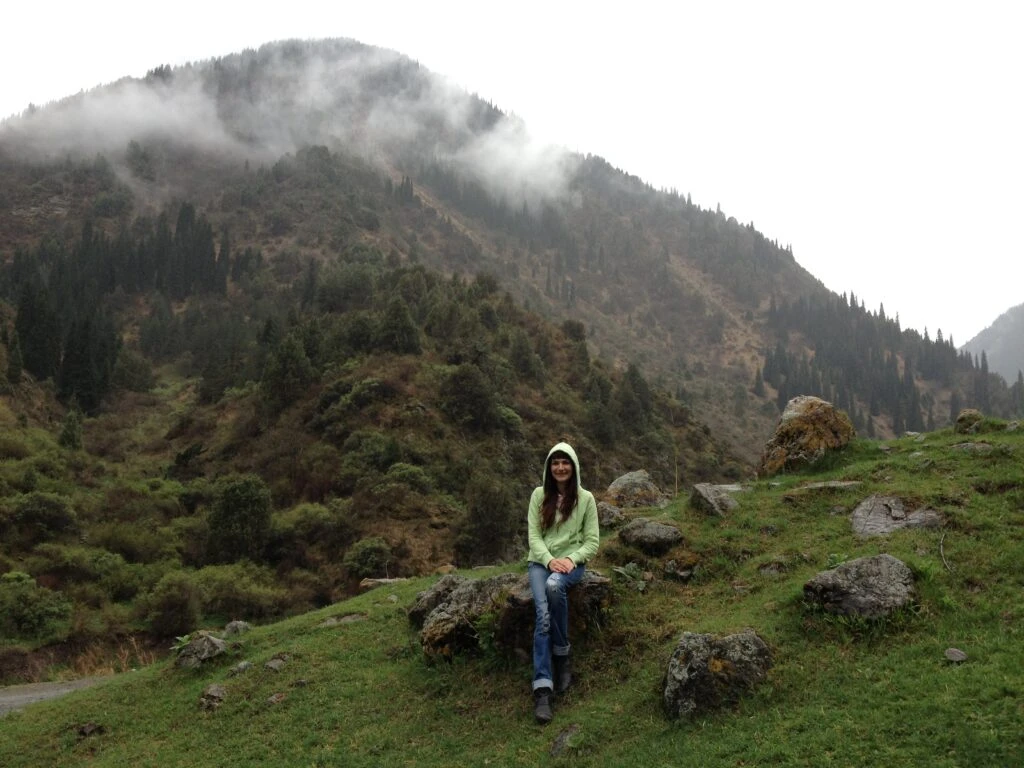
On March 1, 2012 I arrived in Kyrgyzstan. Andriy promised me that I would come for two months and that he would support me financially.
You didn’t say “yes” to Andriy in Ukraine?
Katia: It turned out that I said “yes”, but I wasn’t completely ready. Yes, I was happy with everything, but my negative experience prevented me from doing so. Andriy said he wanted me to be his wife, but I needed more time to think about it.
Andriy: We served separately. The main goal was for Katia to see how life is in Kyrgyzstan and to make a decision: either she moves to Kyrgyzstan and we get married, or she leaves and we end the relationship.
We had some difficulties and even a language barrier. She spoke a kind of Russian, but it was like her own language. And of course there were difficulties in the relationship that we had to build as a man and a woman. Nobody really taught me how to do that.
But I liked her inner values as a person, her faith in the Lord, her love for God, her willingness to serve, her independence. That was more important than cultural differences.
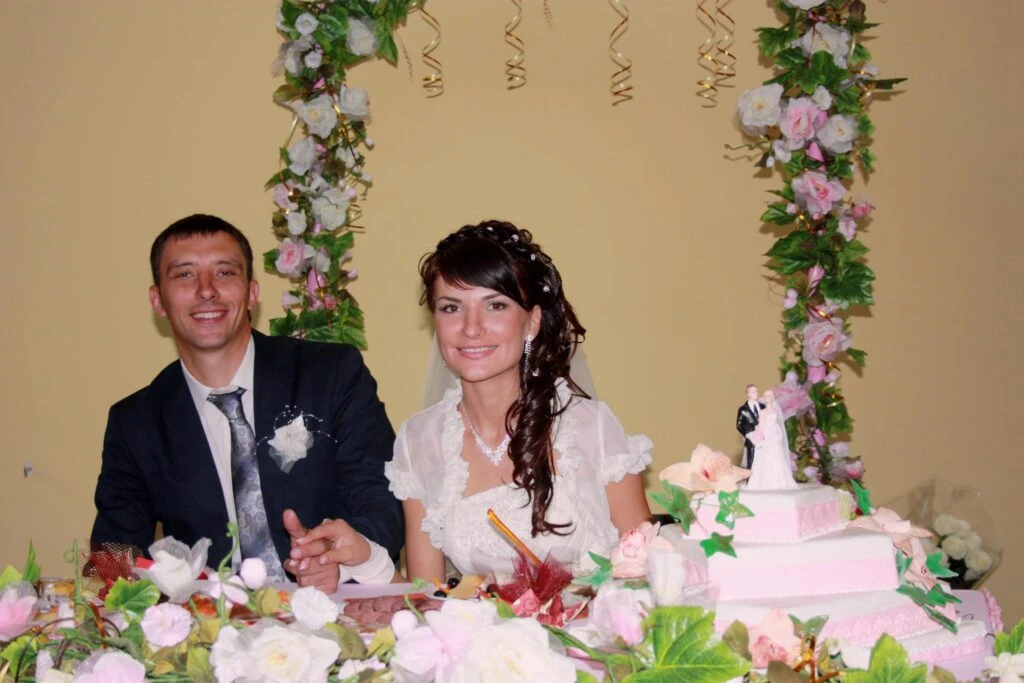
We got married on September 1, 2012 in Berdiansk ( Zaporizhzhia region in Ukraine).
Then we honeymooned in Turkey, from where we immediately flew to Kyrgyzstan.
What difference did you notice in the cultural aspects? And was there one at all?
Katia: Andriusha was very concerned about how I would fit into the local culture in Kyrgyzstan. He was lucky: the Gagauz are similar to the Eastern culture. Their cultural values and traditions are so similar to the local ones that I even thought I was back in my village.
The Gagauz are a particular branch of the Turkic people. Kyrgyzstan, Azerbaijan and Kazakhstan belong to this group. They even have similar languages.
What are the family values in the Gagauz culture?
Katia: We do not have divorces, it is considered a shame. A man is supposed to be superior to a woman in every way. A woman raises children, a man takes care of them. He does not cook or clean at home.
By the way, when I saw Andriy cleaning the house, I felt uncomfortable, but on the other hand it was good, because it is a way to clearly divide the household duties.
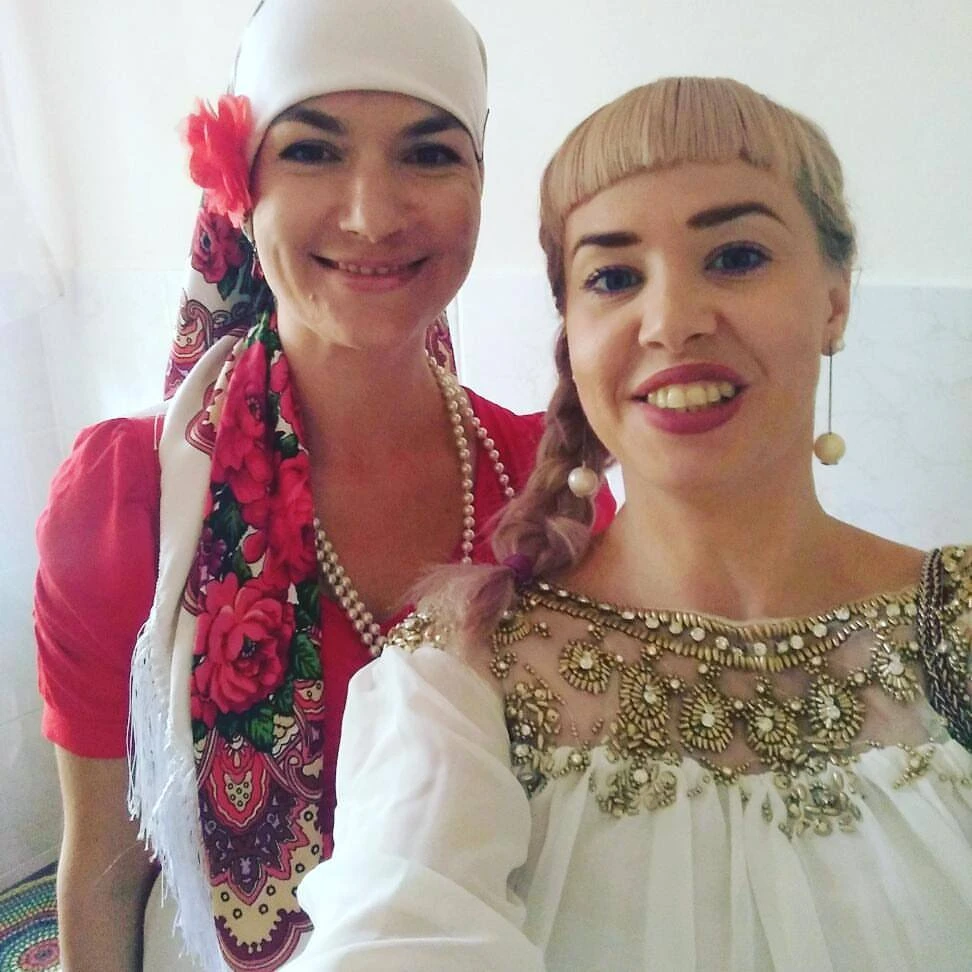
A Gagauz woman can work, but she is also free to stay at home, and her husband will not mind. Children are taught to respect their parents and elders. To this day, we address our parents as “you” (instead of a casual “thou” – ed.).
If there are two men in a room, women or little girls should never be there. Women are not supposed to interrupt when men talk. Women serve the table and leave the room.
It is highly appreciated to show yourself and your wealth to your neighborhood and relatives.
You may have only wine and cheese in your house, but you must show that you have the best wedding or funeral.
How do you propose in your culture?
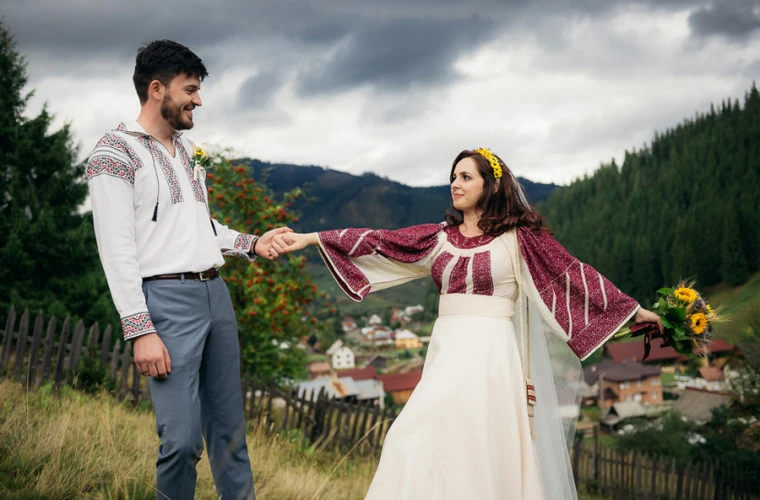
Katia: We have two ways: with or without a kalim. If there is a wedding without a kalim, it means that the bride has been stolen before, although it was with the consent of both.
With a kalim, it is a contract. The husband has to provide a house, and the wife has to provide everything in the house.
My father was very serious about the kalim. He wanted a Gagauzian son-in-law, and he had everything set up… and here is a Ukrainian.
Andriy, how were you raised? I understand that your mother taught you how to cook and clean?
I grew up in the 90s, alone in my mother’s house. Before I became a Christian, I was not a conscious person, I was addicted to drugs and alcohol. I repented in 2003, lived in a rehab center, then became a leader there, my pastor became a role model for me.
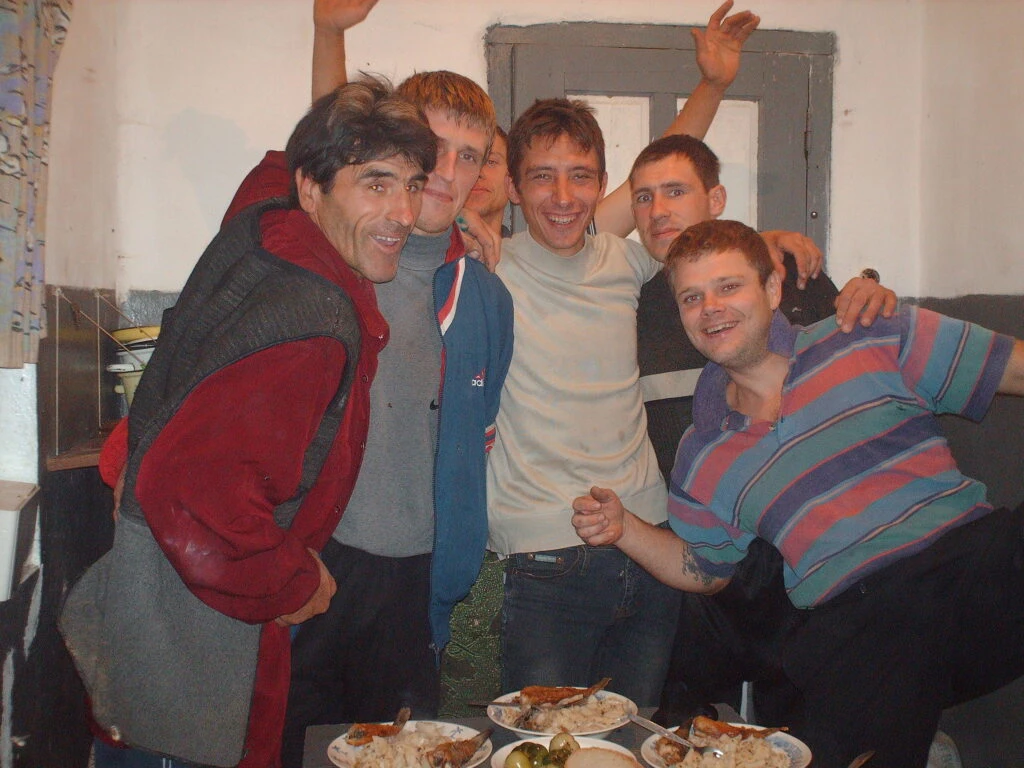
For three years I lived on my own. We cooked, cleaned and did our own laundry. That’s how I learned.
What was difficult for you to accept about Katia’s culture?
There was a problem: my wife kept saying that she was a Gagauz. And for me, the concept of nation is not so acute. You know, Ukrainians used to make a little joke about Moldovans. Even in the Christian environment, when Moldovans came to our church, I used to make fun of them.
I grew up in an aggressive environment where we had to survive. Even in the Ukrainian churches in our region, people made fun of each other. And it wasn’t because they didn’t love each other, but it was somehow natural, it even looked like a manifestation of love and some kind of closeness.
Katia: And in our culture that is unacceptable.
Andriy: I joked with her and it seemed to offend her. She kept telling me that she was a Gagauz. How many times? I told her: You’re no longer a Gagauz, you’re in Kyrgyzstan.
I myself see myself more as a culture of the Kingdom of God.
What do you see as the key to intercultural relations?
Andriy: I think that our marriage has been very enriching because we come from different cultures. My wife has complemented me a lot, my world has changed a lot thanks to her.
At the same time, I have had a positive influence on her. When we started to accept each other, we learned to take the good from each other. And that changed me a lot, I was able to discover a whole new world for myself: her strengths, her higher education, her knowledge of many languages. It is clear that this person was preparing for a mission.
Katia: For me, given the culture I grew up in, a man is someone who only brings money, and whether he plays with children or not, for example, is up to him. Andriusha is different.
He often tells me that I have to tell him what I need his help with. And that was very hard for me to accept. I still struggle with it. Why tell him, I thought, can’t you see for yourself? To me, my requests to him looked as if I would be humiliating him if I told him. Gagauzians don’t do that.
Tell us about your ministry in Kyrgyzstan.
We have been in Kyrgyzstan for 12 years now, so our mission has been varied. During this time, we first tried to help in different projects and churches: rehabilitation centres, economic work, social areas, and after Katrusia arrived, we started a children’s ministry.
In 2019, with the blessing of other pastors, we started a new church for teenagers and children.
In a Muslim country like Kyrgyzstan, how easy is it to serve?
There are different nationalities in Kyrgyzstan, but for the most part everyone considers themselves to be Muslim.
We have an understanding of holistic mission, which means that when we do something for society, we meet the needs of people who are open to God.
In our area it is not easy to be a Christian; if a person is Kyrgyz or Dungan, for example, it is like betraying the local culture and traditions. So not everyone is ready, even if they are interested in Christianity.
Our church does not have a large number of people, and there are Kyrgyz among them.
There is no big movement in the churches, and preaching the gospel in the streets is officially forbidden, but activities inside the church building are allowed.
Kyrgyzstan is more of a secular country; there is no punishment for evangelistic activity yet, but they are trying to limit it. On the other hand, they understand that radical Islam is also unacceptable to them. If a person has consciously come to the evangelical church, there are no serious questions from the state, but rather from relatives.
What are the family traditions of the Kyrgyz?
Katia: Family traditions are associated with rules and old rituals. Circumcision and bride stealing are quite common. But in recent years they have tried to fight against this. Women are oppressed in Kyrgyzstan. For example, if a man is aggressive towards a woman, it is very difficult to protect her.
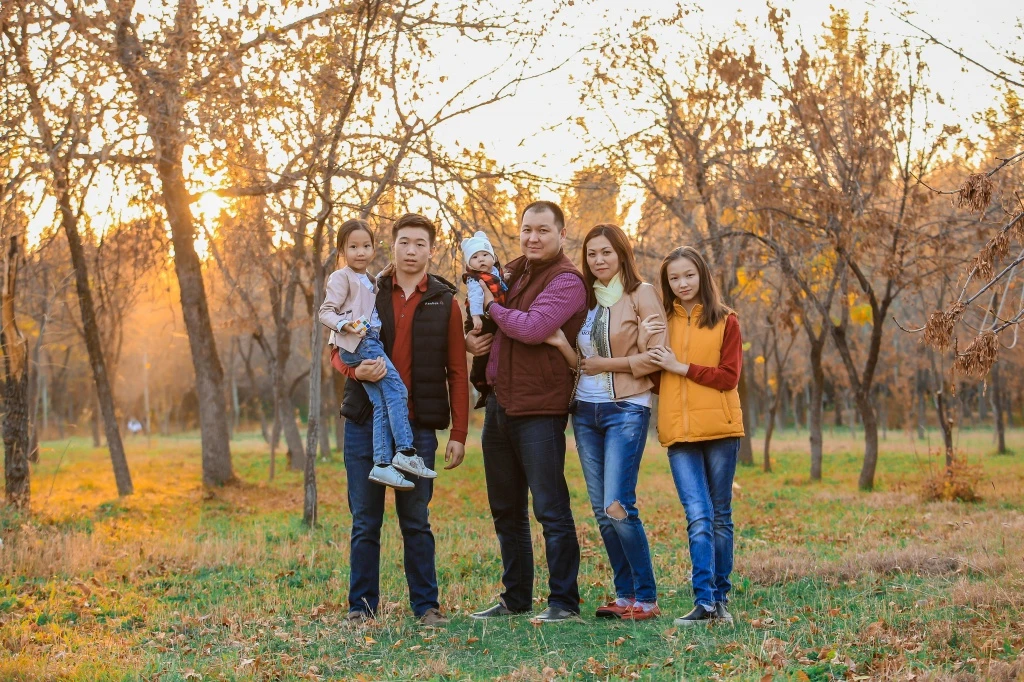
Families have many children, and four children is not a lot. Usually a woman does the housework while a man works. When a girl marries, she first has to look after the house as a daughter-in-law and always wears a white headscarf to show that she has just got married. The young couple has to live with their parents for a while. The younger son and his family stay with the parents.
Some children may be given to grandparents so that they don’t get bored in their old age, usually the eldest child is given, especially in the villages.
Not everyone earns good money here, so children are given away to go to work, which about 15% of the population do.
How does serving together affect family relationships?
Andriy: We both serve, and Katrusia does as much as I do. She has her own projects and I have mine. We are both leaders, so we have to work together. But at the same time it’s good.
The way I see it, a wife should also serve, not just sit with the kids and take care of the house. I always wanted to have a person at my side who would serve with me. That’s why I try to do everything I can to make my wife’s life easier, and I’m involved in some global issues.
Katia: Indeed, we are both leaders. My education has helped me a lot. I’m a manager by profession and I worked in advertising for a long time, so I’ve worked with people.
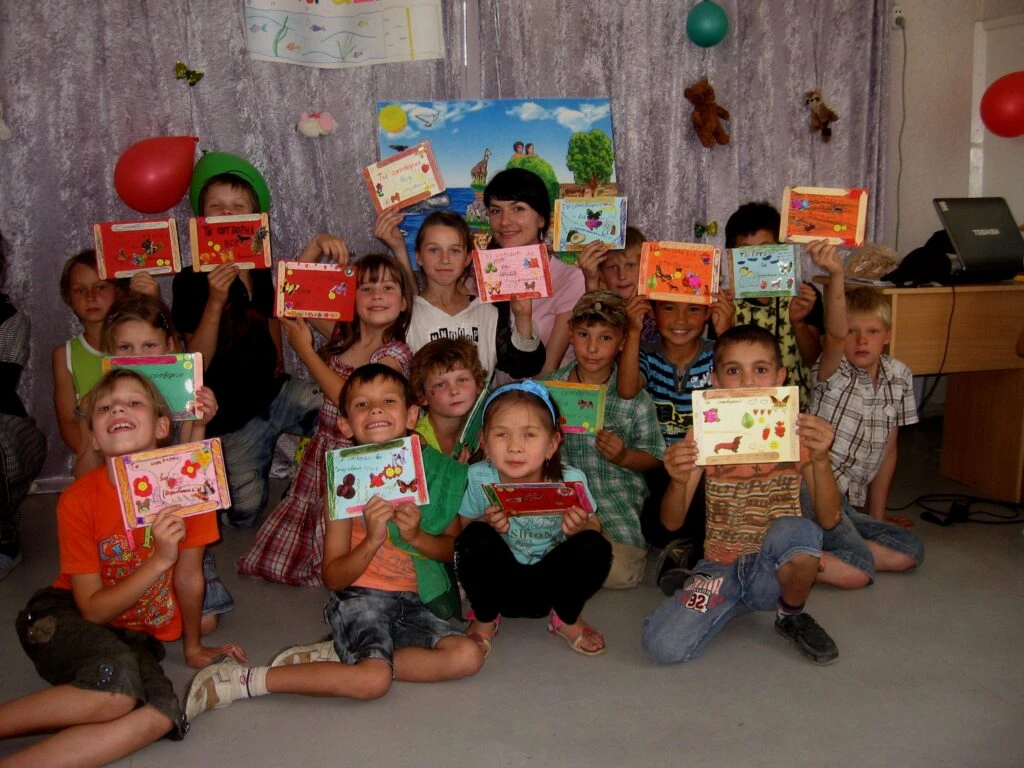
In Kyrgyzstan, after we got married, Andriy told me that if I did not want to work, he would take care of the family. But if I wanted to work, he would want me to find a job that was not a burden, but one that I enjoyed.
In Gagauz culture, women are not asked if they want to work or not. If she has to, she will work, and if not, she will stay at home.
This attitude of my husband motivated me to look for and find myself when I was 28 years old. I started to work with children, and I put into practice all the knowledge I had in law and management.
If God wills and we live, I may do a second degree as an English teacher.
My husband has also encouraged me to do this. We have a learning centre and my husband had the idea that I should work there as a teacher.
Before that, I taught children at a low level to attract them to the church.
I worked as a teacher at the centre for three months, and Andriy went even further – he offered me a job as a tutor.
It’s so easy to find a job in Kyrgyzstan! For example, they don’t ask if you have a diploma. In Moldova, we have big problems with this. If you are not a certified specialist, you can also be fined for illegal activities. Any civil servant or teacher must speak the state language. There are no such requirements in Kyrgyzstan.
Thanks to this freedom, I opened up and started working as a tutor, deciding that I would devote part of my time to evangelism and part to teaching private lessons.
We live in a two-story building, with our house on the second floor and our ministry on the ground floor, and the children come to me for English lessons.
Do you have conflicts more often in the ministry or in everyday life?
Katia: It seemed to me that more often at the level of ministry. Andriy is not conflicted about everyday issues. I try, of course, to keep the house clean, cook, etc. But even if I don’t have time or don’t do something, I know that there will be no conflict. As for the ministry… yes, we can have conflicts.
The hierarchy that God has established is that the husband is headed by Christ, and the wife is headed by her husband. How do you deal with this in your ministry?
Andriy: We try to understand that a husband should love his wife from the position of serving, not from the position of dominating, and then everything works well.
I don’t think we have any conflicts in our ministry. I think that we have more conflicts in everyday life and theological conflicts.
Katrusia has more notions of justice and discipline. I have the need to serve, to love, to cover.
And while we were learning to understand each other, there were, of course, conflicts.
After all, does serving together help strengthen the family? Or would it be better for just one person to serve?
Katia: It depends on the person’s character and upbringing. Because in the ministry we become very well behaved, we are praised by others, and we like to serve more because we are doing everything for the good.
But we return to the family, where we are no longer workers in the ministry, but a family. And we can use that to get our way.
So, being in ministry together is an advantage, because we know our strengths and we can get to the goal faster. And somewhere it is a disadvantage – at home we can continue to analyze issues that we did not analyze in the ministry.
So the wisdom is that if we know our weaknesses in the family, we can serve in love and acceptance as much as we serve in ministry or work, and then we can do much more together than we can apart, combining our gifts and abilities to expand God’s Kingdom.
Andriy: Of course it will be better if people serve together, do something together, then there is more common ground.
If a person has a home and serves outside the home, and the spouse is not involved in the ministry, the relationship can become complicated. Yes, relationships depend on people and their perception, their culture, how much they understand each other.
After we started a new church and we had a vision of the church that we were planting together, without the influence of someone from the outside, it became easier to serve. After all, churches may have different teachings on family: whether it is right or wrong for a woman to serve, or whether she should stay at home and take care of the children. Or they push you to serve, motivate you, but don’t really care about the well-being of your family.
Sometimes the relationships in the church and the ministry are not quite coordinated with what is happening in the family. But we have the concept of serving together as a family.
Tell us about local Kyrgyz cuisine.
In Kyrgyzstan it is common to eat in cafes.
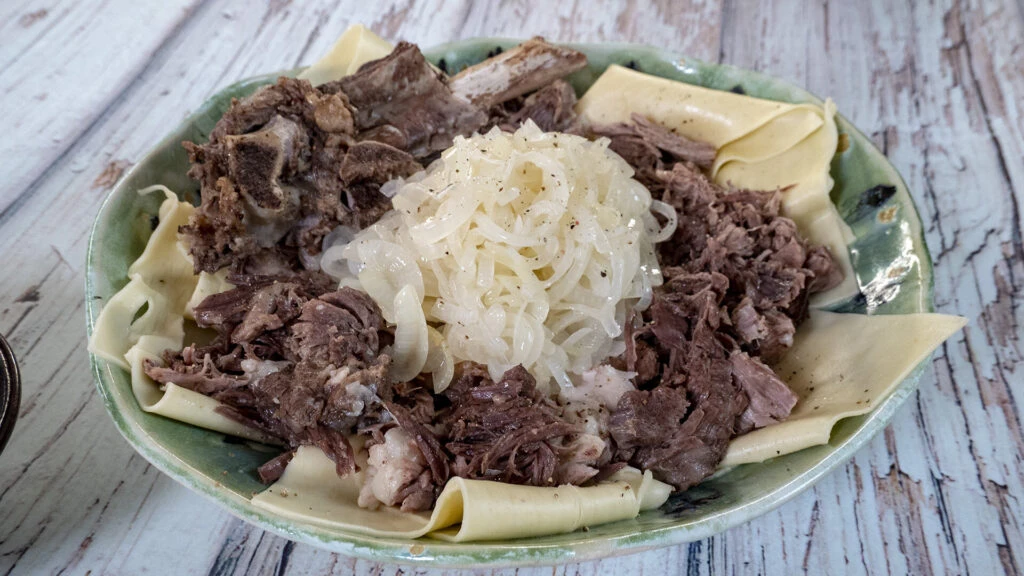
Beshbarmak is a Kyrgyz main dish, meat and dough. It is a kind of chopped noodles mixed with horse meat. They can also make it with sausage. It all depends on who the dish is for. They make noodles out of dough, boil the broth with meat, and throw the noodles in.
For the poorest people, the most common food is a hot shortbread and tea. If sour cream is added, it is considered a complete breakfast.
They like to have berry jam in a bowl at the table. This is the cheapest option.

Boorsok is a dish cooked in boiling oil. It looks like donuts and is considered a must on the table.
People love shish kebab, which is made of lamb. Pilaf and dimlyama are also made of lamb. Dimlama is similar to a stew made of potatoes, cabbage, peppers and eggplant. It is cooked in a cauldron.
Pilaf is also one of the main dishes. There is also samsa or manti. Samsa is the same as manti, only fried.
The country is also influenced by Chinese cuisine.

For example, a common dish called lagman is noodles, but they are pulled by hand, beaten, and then gravy is prepared for them.
We eat this kind of food in cafes because it is cheaper.
What would you recommend to missionaries who want to create an intercultural family?
Andriy: First, there must be a commitment to each other. You have to choose a person not because you like him or her, because he or she is beautiful, but a person with deep values, who wants to serve, who chooses love for God.
When a person is on a mission, this becomes a great advantage because we are shaped by the concepts of our churches.
For example, I lived in Berdiansk, where I had my own church culture. Involuntarily, in another place, I would begin to reproduce something similar to what I saw in my church.
But this is not always good, and in most cases it is bad, because there, in another culture, you will not be able to build what you saw in the church. And the opportunity to serve somewhere with people who are not like you opens up the possibility not to focus on some framework and cultural peculiarities, especially Christian ones, but to understand that as a missionary you have to learn to live in the culture you are in.
You have to learn how to live in a new culture, taking into account that culture. And to bring there not just some traditions and rules, but the essence of Christ himself: love, the Gospel, but in a completely different tradition. An intercultural marriage contributes to that.
Realizing that my wife is different, I have learned to understand her, and at the same time I have learned to understand more about the people with whom I live in a culture that is foreign to me.
Katia helped me see that I had to leave the culture I was living in, just as I told her I had to leave mine.
It’s easier to change cultures when you’re with someone from a different culture. For example, Katia is a Baptist and I am a Pentecostal. We are different, but at the same time we are Christians and we have learned to accept each other.
At first it was difficult for me, but then I realized that because of the church cultures we grew up in, we try to force people into a framework, to build certain barriers for them.
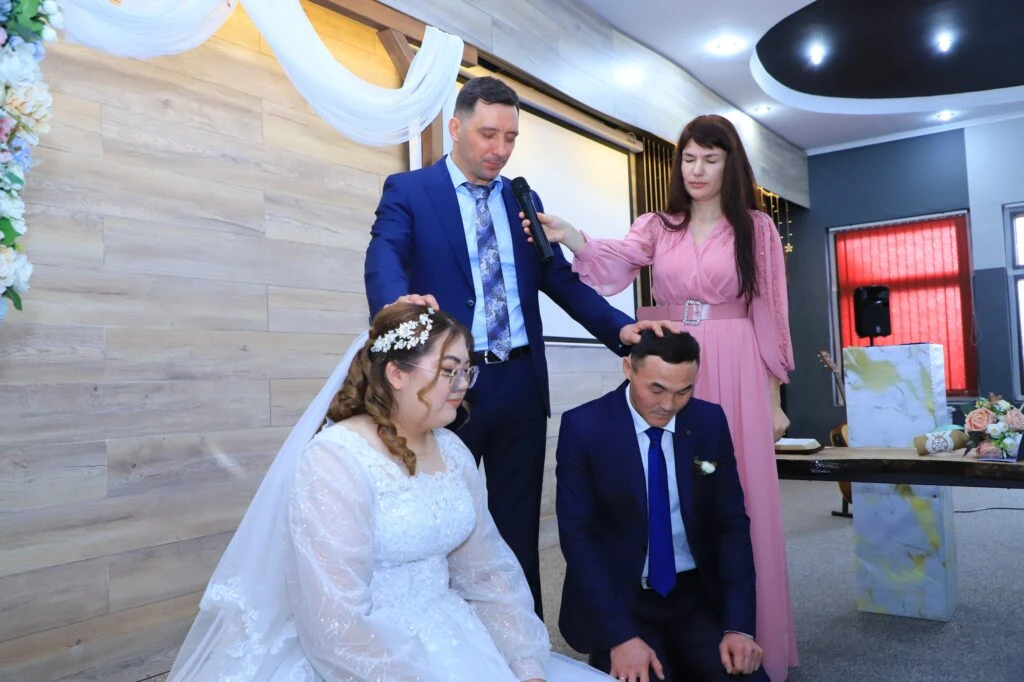
The ability to accept other people, Christians, makes it possible to look at Christ, Christianity, and ministry together in a different way. It is a process of development.
Katia: When I was in Kyrgyzstan, one of the pastors read the following Bible verse: “By this all people will know that you are my disciples, if you have love for one another.”
It was like an answer to my questions about Christians in rehabilitation centers, because I knew nothing about them. The only thing I was told was that they were very zealous Christians. I realized that if I focus on the secondary things, we will not be able to connect with each other as believers. If the primary thing is Christ and love for one another, then everything else will fall into place.
I think that when an international couple decides to be together, they have to love each other, accept each other, because culture cannot be taken out from within, it will remain.
And also to pray a lot and pray all the time, not because it’s bad or difficult, because missions are not easy, sometimes very difficult, because the family itself is a mission. But people look at us as an example and we have to live up to it.
Thank you for talking to us.
CITA Press Center.
